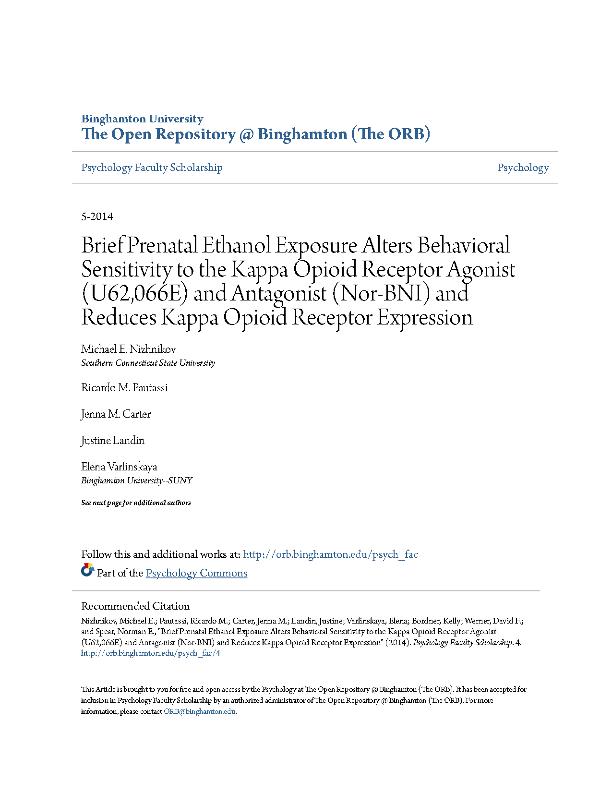Artículo
Brief Prenatal Ethanol Exposure Alters Behavioral Sensitivity to the Kappa Opioid Receptor Agonist (U62,066E) and Antagonist (Nor-BNI) and Reduces Kappa Opioid Receptor Expression
Nizhnikov, Michael; Pautassi, Ricardo Marcos ; Carter, Jenna M.; Landine, Justine; Varlinskaya, Elena I.; Bordner, Kelly A.; Werner, David F.; Spear, Norma E.
; Carter, Jenna M.; Landine, Justine; Varlinskaya, Elena I.; Bordner, Kelly A.; Werner, David F.; Spear, Norma E.
 ; Carter, Jenna M.; Landine, Justine; Varlinskaya, Elena I.; Bordner, Kelly A.; Werner, David F.; Spear, Norma E.
; Carter, Jenna M.; Landine, Justine; Varlinskaya, Elena I.; Bordner, Kelly A.; Werner, David F.; Spear, Norma E.
Fecha de publicación:
06/2014
Editorial:
Wiley Blackwell Publishing, Inc
Revista:
Alcoholism: Clinical And Experimental Research
ISSN:
0145-6008
Idioma:
Inglés
Tipo de recurso:
Artículo publicado
Clasificación temática:
Resumen
Background Approximately 10 to 15% of women consume alcohol (ethanol [EtOH]) during pregnancy in the United States. Even low amounts of EtOH consumption during pregnancy can elicit long-term consequences. Prenatal experience with as few as 3 drinks has been associated with increase problem drinking in adulthood. Such effects are corroborated in rodents; however, the underlying neural adaptations contributing to this effect are not clear. In the current set of experiments, we investigated whether changes in EtOH responding following prenatal EtOH exposure involved kappa opioid receptor activation and expression. Methods Sprague–Dawley rats were prenatally exposed to low levels of alcohol (1.0 g/kg) during late gestation (gestational days 17 to 20 [GD17–20]) via intragastric intubation of pregnant dams. Following birth, EtOH intake, kappa- and mu-opioid-induced place conditioning, and kappa opioid receptor expression in mesolimbic brain regions were assessed in infant rats (postnatal days 14 to 15 [PD14–15]) that were offspring of dams given EtOH, vehicle, or untreated, during pregnancy. Results Animals exposed to prenatal alcohol drank more alcohol later in life and exhibited significant changes in the kappa opioid system. While control subjects found kappa opioid activation aversive, animals exposed to EtOH prenatally exhibited either no aversion or appetitive responding. Further analysis revealed that synaptosomal kappa opioid receptor expression was significantly decreased in brain areas implicated in responding to EtOH. Conclusions Overall, these data suggest that prenatal EtOH affects kappa opioid function and expression and that these changes may be involved in increased drinking later in life.
Palabras clave:
Ethanol
,
Prenatal
,
Kappa
,
Place Preference
Archivos asociados
Licencia
Identificadores
Colecciones
Articulos(INIMEC - CONICET)
Articulos de INSTITUTO DE INV. MEDICAS MERCEDES Y MARTIN FERREYRA
Articulos de INSTITUTO DE INV. MEDICAS MERCEDES Y MARTIN FERREYRA
Citación
Spear, Norma E.; Werner, David F.; Bordner, Kelly A.; Varlinskaya, Elena I.; Carter, Jenna M.; Pautassi, Ricardo Marcos; et al.; Brief Prenatal Ethanol Exposure Alters Behavioral Sensitivity to the Kappa Opioid Receptor Agonist (U62,066E) and Antagonist (Nor-BNI) and Reduces Kappa Opioid Receptor Expression; Wiley Blackwell Publishing, Inc; Alcoholism: Clinical And Experimental Research; 38; 6; 6-2014; 1630-1638
Compartir
Altmétricas



